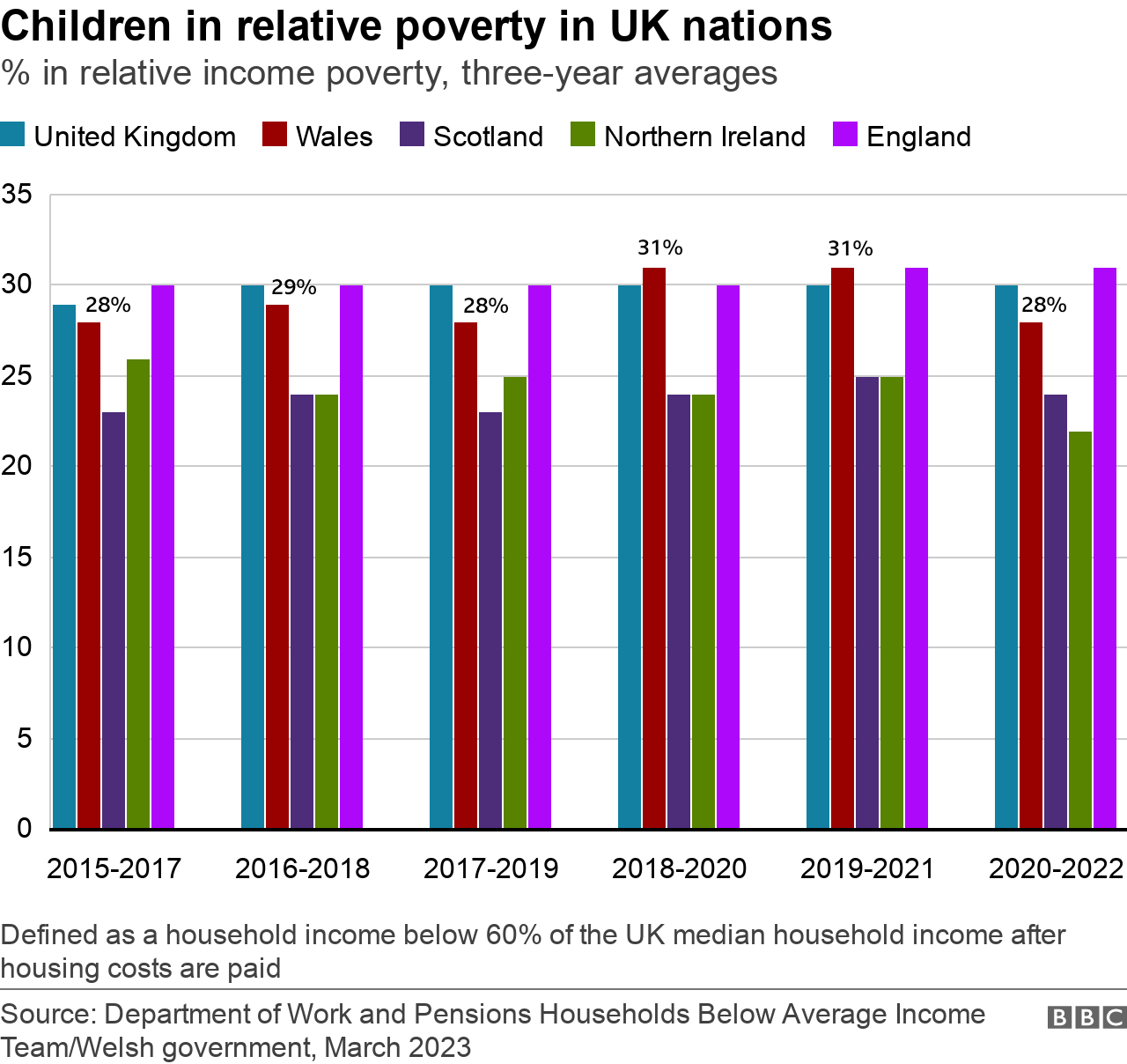Welsh ministers lack ambition to tackle child poverty - MSs
- Published

The Welsh government lacks "ambition" to tackle child poverty, a new report has said.
Some 28% of children in Wales are living in relative poverty - more than Scotland and Northern Ireland.
A committee of the Senedd has called for the Welsh government to reinstate targets, seven years after they were scrapped.
The Welsh government said it was addressing child poverty as an "absolute priority".
But it called for more help from the UK government - which is in control of the benefits system - in "addressing structural inequalities".
The chair of the equality and social justice committee which wrote the report said blaming the UK government does "not help".
A target to eradicate child poverty in Wales by 2020 was scrapped in 2016.
According to figures quoted by the committee, 28% of children living in Wales lived in homes where the income of their household was less than 70% of the UK average between 2019 and 2022.
While that decreased between 2012 and 2022, rates have been consistently higher than in Scotland and Northern Ireland.
The most recent figure is lower than the UK average of 30%, and six of the nine English regions.
Ministers in the Welsh government are currently drawing up a draft strategy on how the issue will be tackled.

But the Senedd's equality and social justice committee said the draft strategy lacked ambition.
Members of the Senedd (MSs) on the committee argued the Welsh government needed to "overcome its resistance" to setting targets.
It said evidence to the committee from experts and data from other countries, such as Scotland and New Zealand, showed governments need to set targets to focus attention.
The report said that in the foreword to the draft strategy the Minister for Social Justice Jane Hutt criticised the impact of UK government policy decisions on efforts to tackle child poverty.
"Since 2010, and the age of austerity, investment by successive UK governments has been reduced. Child poverty targets have been abandoned," it said.
But the committee's report criticised the strategy's focus on the UK government.
"We fully recognise the strain on Welsh public finances, and that the most significant policy levers for redistributing wealth and reducing inequalities are held by the UK government and Westminster.
"However, the strategy's primary message should be what the Welsh government can do to alleviate child poverty, rather than what it cannot do."
It said there was "deep unease" among bodies which look at the issue "about the lack of targets and milestones".
MSs called for a dedicated minister for children, and called for a commitment from the Welsh government to use cash raised from increased spending in England on childcare to "fund seamless and affordable childcare and to develop plans for doing this by July 2024".
'More children in poverty than other age groups'
On BBC Radio Wales Breakfast, committee chair Jenny Rathbone said blaming the UK government "clearly... doesn't help".
"What we have to do in Wales is identify the things that we can do," she said.
"As one of our witnesses said, we might as well shut up shop if we say we can't do anything about it."
Plaid Cymru's Sioned Williams said "eradicating child poverty in Wales should be at the forefront of the Labour Welsh government's work, but over the years we've seen them miss targets to tackle child poverty and then scrap these targets altogether."
Conservative Shadow Social Justice Minister Mark Isherwood, said: "Labour have been directly responsible for tackling poverty in Wales over the last 25 years, but this report highlights their sheer failure in doing so.
"They cannot blame the UK government for all of the problems facing Wales, problems they themselves have the powers to deal with."
The Welsh government said: "We are addressing child poverty as an absolute priority and continue to work together with our partners towards a Wales where every child, young person and family can prosper."More than 3,000 children, young people, families and organisations have engaged in the development of the revised child poverty strategy. This has helped us to focus on where our policies can make the biggest difference and identify priority areas where we will accelerate action."However, significantly reducing child poverty in Wales will require the UK government to show an equal level of commitment and to play a far greater part in addressing structural inequalities than it has done since 2010."
Related topics
- Published5 June 2023

- Published1 November 2022
